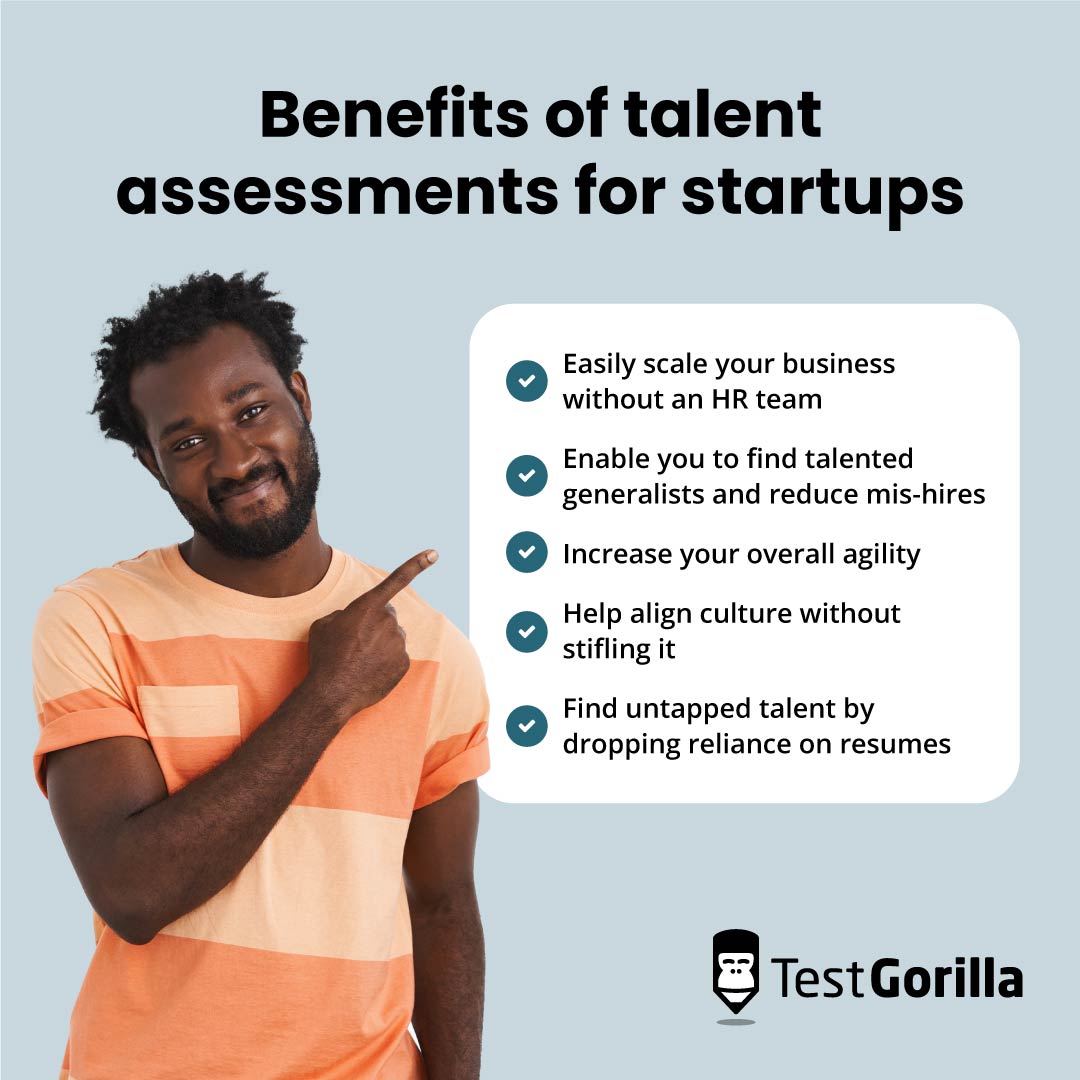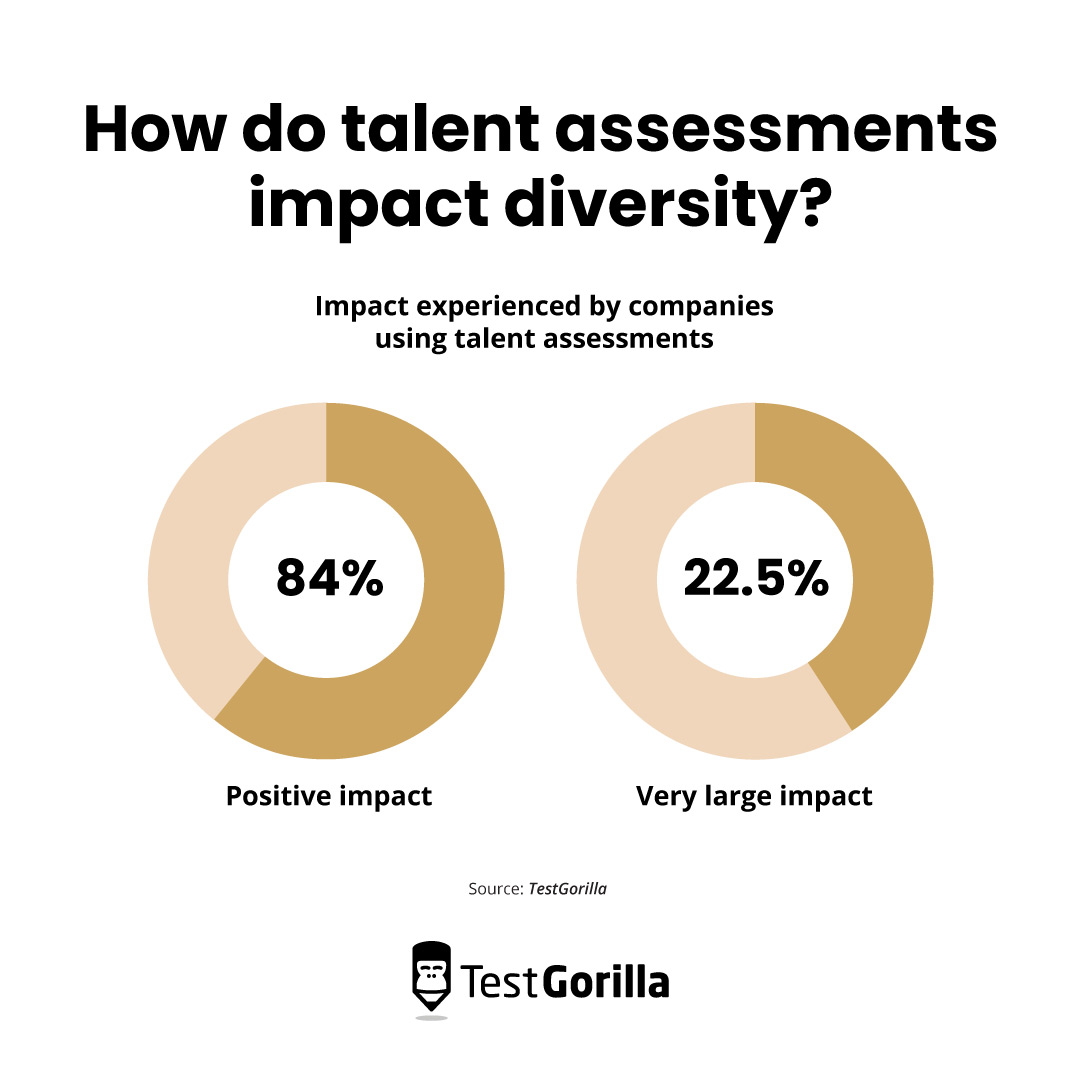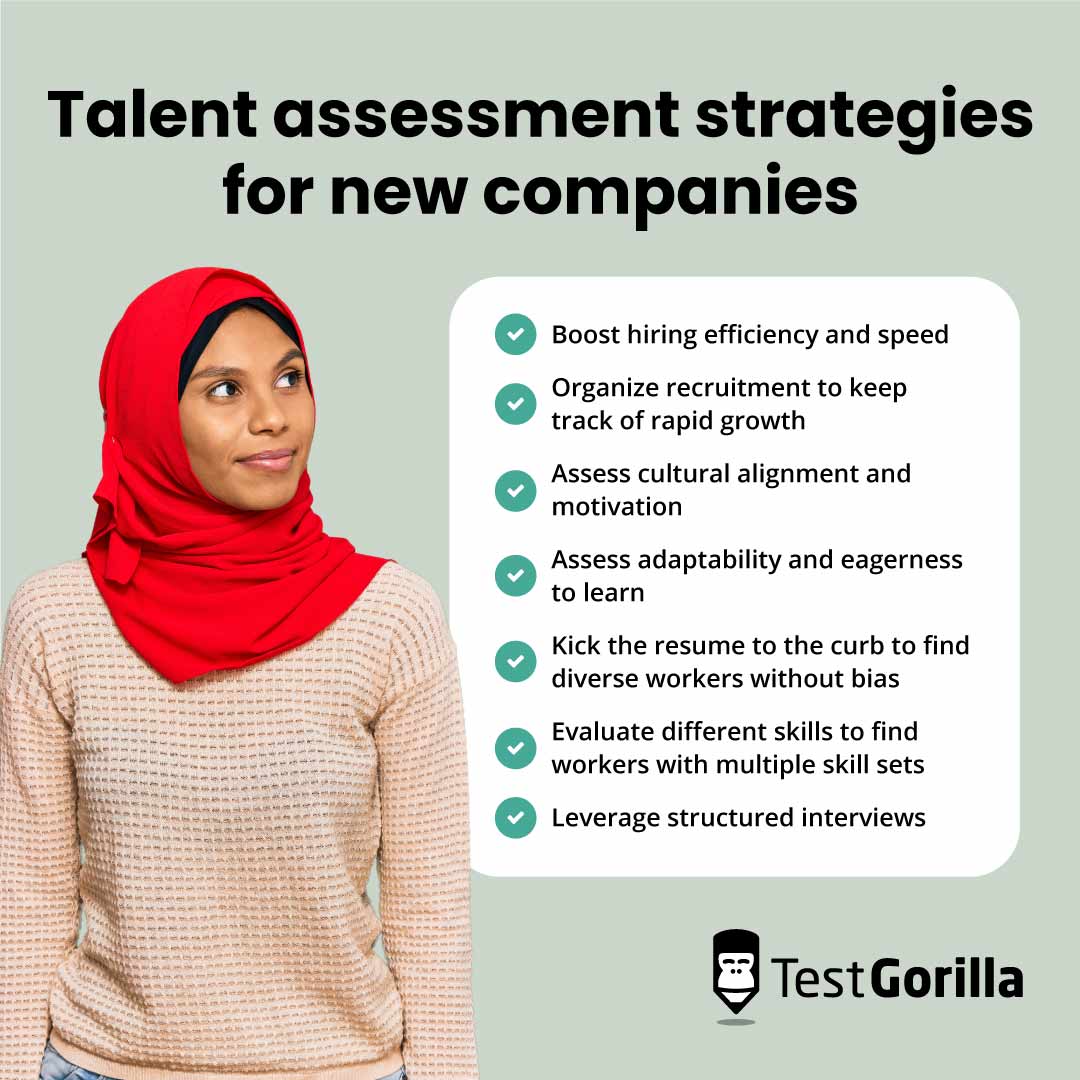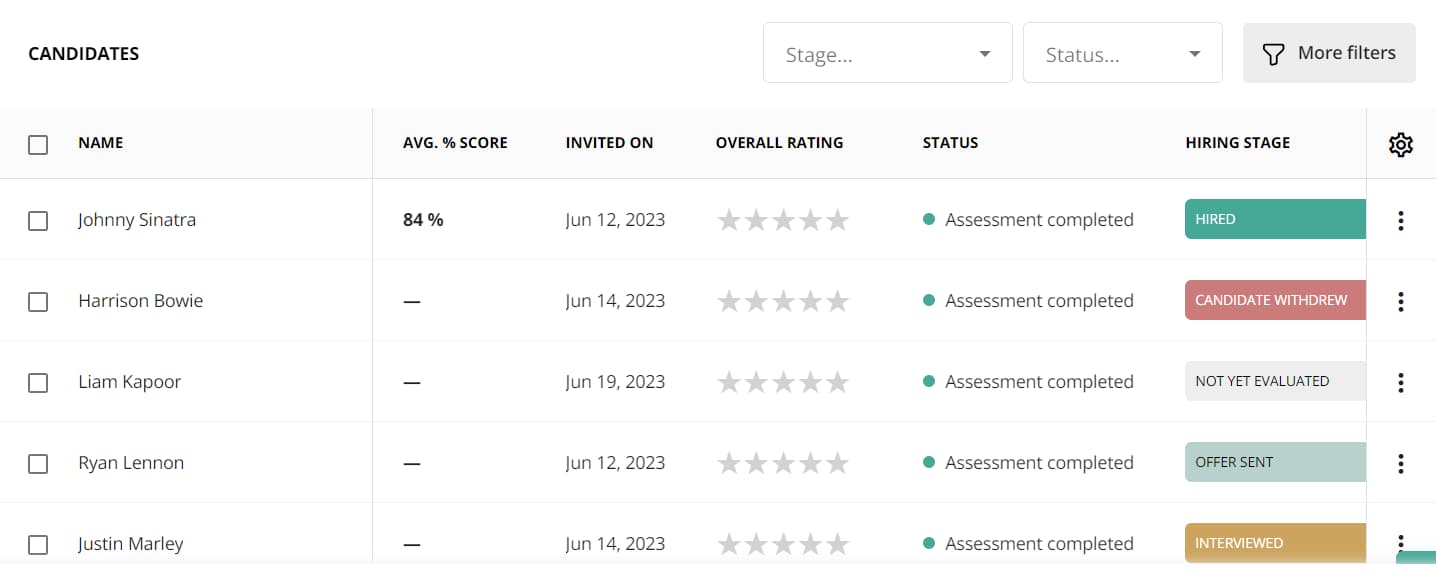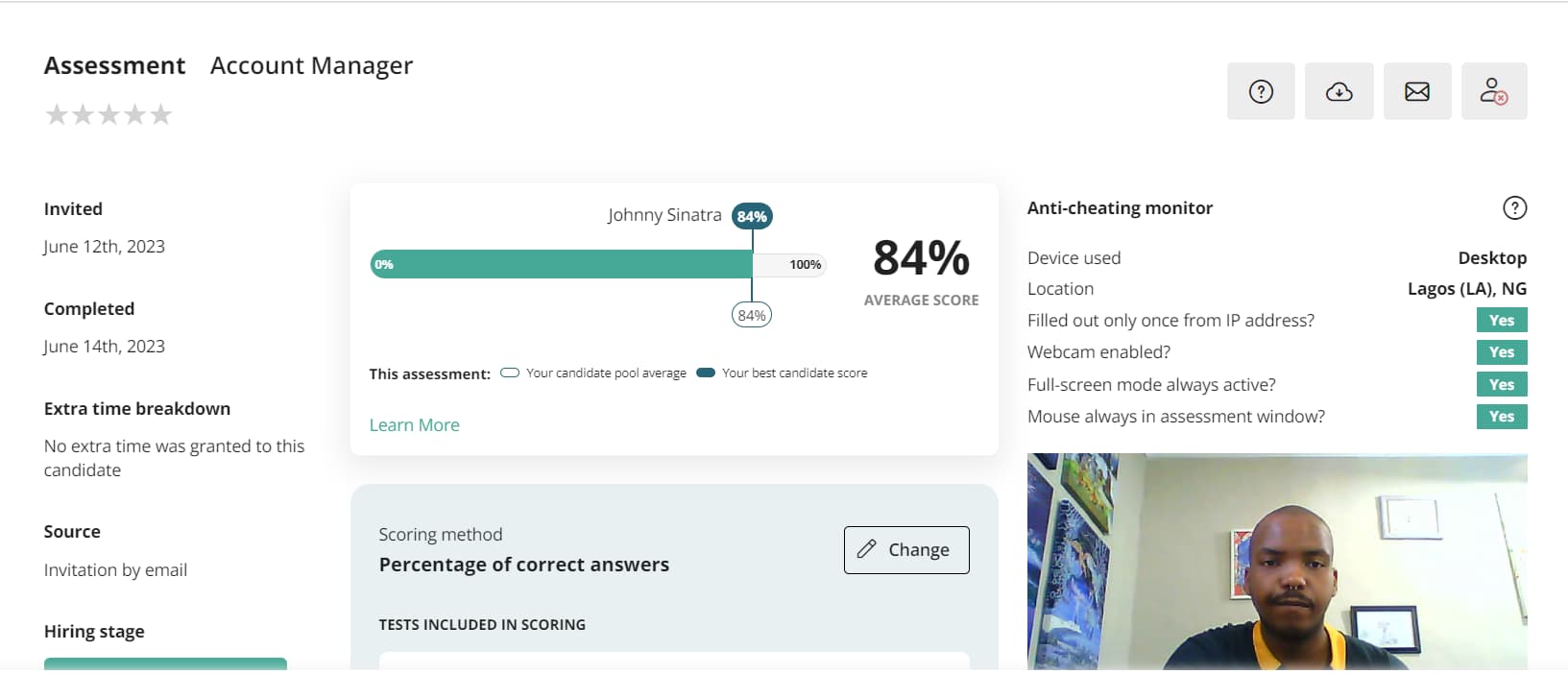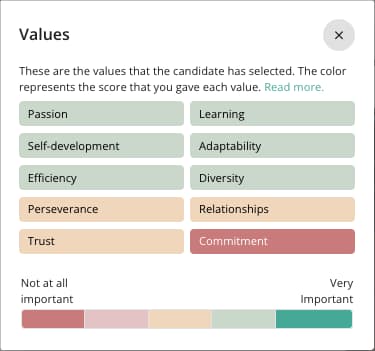You’ve got an amazing idea – now you just need a great team to help you bring it to life.
But startups face unique challenges when recruiting, whether it’s the first employee or a new addition to a small team.
The difficulties include finding people committed to your mission, hiring expert generalists, and ensuring candidates are agile enough to work in a growing environment – to name just a few.
To make things worse, 23% of startups fail because they don’t have the right team, and hiring is usually up to one teammate or even the founder themselves.[1]
You can streamline the process by using talent assessments for startups.
Talent assessments help you gauge culture and adaptability and zero in on multi-skilled talent.
They’re also ideal for rapidly scaling companies because of their ease and simplicity.
This article discusses the benefits of using talent assessments for emerging businesses and the best practices to implement them in your company.
Table of contents
- What are talent assessments for startups?
- The benefits of talent assessments for startups
- How to get the most out of talent assessments: 7 best practices for startups
- 4 examples of startups succeeding using talent assessments to find mission-driven talent
- Hire for agility with talent assessments for startups
What are talent assessments for startups?
Talent assessments for startups are various hiring methods that evaluate skills for new businesses and address key issues, like the ability to build custom assessments to target highly specific roles.
A few common types of talent assessments include skills tests, structured interviews, and job trials.
Startup assessment tools help new ventures manage the difficult task of hiring and find great candidates using objective data at the same time.
It isn’t just startups that are picking up this strategy. Talent assessments for SMEs and enterprises are also on the rise, showing that talent assessments suit a range of business sizes.
Talent assessments are objective, accurate, flexible, and customizable. It’s easy to make assessments that address each type of company's different growth needs.
Talent assessments are gaining traction quickly as increasingly more employers discover their value. More than 70% of companies agree that talent assessments are more effective than resumes.
The benefits of talent assessments for startups
Talent assessments for emerging businesses help address hiring challenges like scaling your business efficiently and quickly.
They also enable you to find talented, agile generalists who can respond to your fast-moving environment.
Let’s explore these advantages and more.
Easily scale your business without an HR team
Startups may not have a committed HR team, so assessing applications and resumes takes a long time. A single HR person or even the founder could handle hiring tasks.
Scanning resumes is already a headache, but it’s even worse for a sparse team that may not have an applicant tracking system.
You spend a lot of money and effort on hiring when you already have a lot on your plate, like securing your first customers and working on your branding.
Talent assessments increase hiring speed and efficiency, enabling you to manage multiple job ads simultaneously. With a database, you can sort candidates by roles and assessments to keep track of each applicant.
Plus, you can streamline manual processes like assessing language proficiency or sending rejection letters.
According to TestGorilla’s State of Skills-Based Hiring 2023, 82% of organizations using skills-based hiring reduced time-to-hire, which is an essential metric to keep an eye on for startups because of their rapid growth needs.
Enable you to find talented generalists and reduce mis-hires
Employees must wear a lot of different hats in startups.
Talent assessments enable you to hire for skills, which means you can accurately evaluate a marketing professional's sales skills and then have a worker who can handle various tasks.
Accurately assessing skills also helps startups reduce mis-hires.
Mis-hires are detrimental in a growing environment where the impact is much more noticeable – mishandled tasks and poor performance aren’t lost in the crowd like in larger companies.
Bad hires in senior positions can bring down startups. For example, a mis-hired executive destroyed a company’s team-based culture and ended up causing massive turnover.
Talent assessments for startups help you avoid this disaster: 88% of organizations that use skills-based hiring reduced mis-hires.
Increase your overall agility
Startups are a fast-moving environment. They thrive off dynamic movement because things are constantly changing – few processes have standardization, and many things come up along the way.
You could even benefit from using job rotation.
Ryan Rouse, the chief executive of HighKey, says too many startups focus on perfect resumes when they should be considering a candidate’s agility and how they deal with chaotic work.
By using talent assessments, you naturally increase agility. A skills-based environment is all about employees doing the tasks they’re best at without rigid job roles.
Sounds a bit like a startup, doesn’t it?
But it isn’t all about a gradual shift through processes to increase agility. Hiring the right people in the first place is also essential. You can use talent assessments to actively test for adaptability with personality tests.
Help align culture without stifling it
Startups are mission-driven and need candidates to have excellent cultural alignment. One study found that 86% of startup leaders believe a company’s culture contributes to its growth.
The first few months and years of a startup may be tumultuous, so you need candidates inspired by your purpose.
Every candidate has a major impact on culture in a small environment like a startup, so aligning culture is a must.
But if you aren’t careful, you base your entire culture on two or three of your first employees. Doing this is an easy way to fall into the trap of a homogenous culture, which stifles innovation and negatively impacts financial performance.
When you use talent assessments for startup companies, you can objectively assess culture through culture assessments. They help you evaluate core values without relying on bias and gut instinct.
These assessments even apply to large, established cultures. Talent assessments for enterprises help large companies evaluate hundreds of candidates' cultural alignment.
Find untapped talent by dropping reliance on resumes
Companies need skills, not resumes, and many startups are looking for untapped talent that large corporations don’t target.
One way to find this hidden talent is by removing barriers to entry. There are many great candidates out there who are unrecognized because they don’t have traditional qualifications, like four-year degrees.
Using talent assessments for startups enables you to eliminate resumes, degree requirements, and reliance on years of experience. They give you a new, accurate way to gauge candidate quality.
If you drop reliance on degrees, you open the door to thousands more diverse candidates because many marginalized people are less likely to possess these certifications.
Our State of Skills-Based Hiring 2023 report found that 84% of organizations using skills-based hiring report that talent assessments positively impact diversity, with 22.5% saying it had a significant impact.
Diverse talent brings much-needed innovation that gets new ideas for a budding business.
How to get the most out of talent assessments: 7 best practices for startups
Talent assessments for new ventures help you prioritize adaptability and multiple skill sets and keep costs low.
Here are our top tactics for getting the most out of talent assessments, including organizing your hiring process and streamlining hiring efficiency.
Strategies for using talent assessments for new companies: A summary
Strategies | Description |
Leverage talent assessments for scaling and growth | |
1. Boost hiring efficiency and speed with talent assessments | Streamline hiring by keeping an eye on the best candidates |
2. Organize recruitment to keep track of rapid growth | Manage multiple aspects of hiring from one platform |
Use talent assessments to evaluate soft skills and culture | |
3. Assess cultural alignment and motivation | Use the Culture Add test to evaluate core values without losing diverse perspectives |
4. Assess adaptability and eagerness to learn | Measure crucial agility skills to keep your startup fast-paced and dynamic |
Take advantage of talent assessments to discover the right skills and hire talented generalists | |
5. Kick the resume to the curb to find diverse workers without bias | Drop reliance on resumes and applications by starting the hiring process with talent assessments |
6. Evaluate different skills to find workers with multiple skill sets | Create custom assessments that gauge a variety of skills to hire hard-to-find multipotentialites |
7. Leverage structured interviews to zero in on the right skills | Use talent assessments in combination with structured interviews to get deeper, more valuable results |
Leverage talent assessments for scaling and growth
First, we’re going to look at strategies that help you scale your company.
1. Boost hiring efficiency and speed with talent assessments
Many startups don’t have standardized processes and may only have one or two tools, making it highly likely that candidates slip through the cracks.
After all, you manage all your candidates from your email inbox.
You can improve efficiency and speed by adopting talent assessments and leveraging their impressive database.
Here’s how to do it.
First, send talent assessments to your job applicants. You receive the results in real time after each candidate finishes their tests.
Next, you sort through the results by test score:
You can browse the best candidates without digging through hundreds of applications.
You can also judge their capability objectively through scores rather than using your best judgment to screen resumes.
After you’ve reviewed the results, choose your top candidates and invite them to interviews.
You can also quickly and politely reject unsuccessful candidates with the click of a button.
This speed and efficiency help save you time and money – and give your new business an early boost to its employer branding by providing a quick, transparent process.
2. Organize recruitment to keep track of rapid growth
Startups may not have a huge tech stack to manage their processes, but just one piece of software can help you manage a lot.
Talent assessment software offers a lot of features. For example, TestGorilla provides you with:
Recruitment automation: Talent assessment software enables you to automate communication by sending candidates assessments and rejection letters.
A candidate database: You can search this database by name, assessment, and job role. A database filled with candidates helps organize your hiring process and helps you keep track of candidates for future hiring initiatives.
Collected data: Our HR analytics help you gauge successful hires in the future. Our system remembers your chosen candidates to provide a better experience by making suggestions.
These features help you establish a hiring process before you have an HR department.
TestGorilla also integrates with many excellent candidate relationship management and applicant tracking systems. So, after your business grows and flourishes, you can integrate your talent assessments into your greater tech stack.
Use talent assessments to evaluate soft skills and culture
Let’s look at ways to use talent assessments to determine cultural alignment and personality traits.
3. Assess cultural alignment and motivation
Culture keeps a startup strong as it develops into something bigger, but it’s notoriously difficult to measure.
Often, people have to rely on gut feelings, and these feelings can result in mis-hires and homogenous culture-fit candidates.
Culture fit is the traditional way to gauge cultural alignment, but it stifles diversity by making every employee fit into a similar mold.
On the other hand, culture add considers core values and opens the door to different perspectives and backgrounds.
We assess this crucial element with our Culture Add test.
Here’s how it works.
First, you fill out a questionnaire describing what matters to your company culturally – your core values – to have a standard for the test to evaluate candidates.
After the candidates take the test, look at the results to see what values matter to them and how they align with your company.
In this example, if learning, adaptability, and efficiency were some of the most important values to you, this candidate would be a great match.
To get even deeper insights into a candidate’s suitability, try combining this test with our Motivation test. This assessment determines key job preferences and expectations to see if the applicant is a good match.
4. Assess adaptability and eagerness to learn
Startups are constantly shifting environments. Some could even say they’re chaotic, meaning you need workers who can adapt to new situations and thrive.
Talent assessments for startups make this process simple and objective.
For instance, our DISC test measures key elements of adaptability, including how your candidates take action, make decisions, and collaborate.
Our 16 Types test, which gives you insights into the candidate’s work style, including their main source of energy, how they process information, and their preferred lifestyle, is another great way to assess candidates.
These two tests help you understand adaptability and overall work style, but what about learning agility? Quickly learning new skills and concepts is essential in a fast-paced startup.
We recommend a selection of cognitive ability tests, such as our:
Problem Solving test
Attention to Detail test
Critical Thinking test
These tests help you determine a candidate’s ability to take in information, process it, and develop solutions, which are critical for learning new things.
Take advantage of talent assessments to discover the right skills and hire talented generalists
Finally, we’re going to look at how to discover multi-talented individuals who help bring your vision to life.
5. Kick the resume to the curb to find diverse workers without bias
Many startups struggle with diversity, particularly in the tech sector. Startups run on innovation and creativity, so they need the diversity that fuels them.
Traditional hiring methods, like bias-ridden resumes, strain diversity. Many hiring managers don’t even want to use them.
Our research found that 44.6% of employers rely on years of experience only because they have no other way to qualify candidates.
Talent assessments give you an even better understanding of a candidate’s skills and competencies.
We recommend starting the hiring process with talent assessments. That means ditching applications, too. Yes, even applications hold an opportunity for unconscious bias.
Avoid both of these traditional hiring stages by having candidates fill out assessments as the first step in the process. Don’t worry – if you have non-negotiable qualifications, you can address them immediately by having candidates fill out qualifying questions first.
If your hiring process starts with resumes, it filters out great candidates before they can take an assessment. Starting with skills tests keeps as many great candidates in your pool as possible.
For more insights on inclusive recruitment, read our article on diversity hiring.
6. Evaluate different skills to find workers with multiple skill sets
Startups rely on generalists, especially initially, but workers with multiple skills aren’t easy to find.
Many professionals advertise they’re specialists. Even if they have other skills, they aren’t likely to put them in a resume because many employers want to see specialists with laser-focused, role-relevant skills.
They are even less likely to have formal recognition for each skill they excel in.
With talent assessments, you can build a custom assessment with skills tests from different categories to gauge multiple skills at once and find multipotentialites.
We also recommend using cognitive ability tests to look for potential. High potential (HiPo) candidates are ready and willing to develop into something more, and they are excellent for a growing business.
These tests measure traits like curiosity, learning, and creativity. After all, you can train for technical skills, but it’s much harder to train for innovation.
7. Leverage structured interviews to zero in on the right skills
Not all talent assessments are skills tests. Structured interviews also fall under this umbrella and are an excellent way to assess skills and reduce mis-hires.
These are distinct from standard, unstructured interviews for a few reasons:
They have a prewritten script
They have predetermined success criteria
They focus on behavioral and situational questions
They focus on role-relevant skills
Structured interviews work great with skills tests. For example, you can use these interviews to delve further into the results of a skills test and get deeper information.
Some tests, like the DISC test we mentioned earlier, even give you suggested interview questions after the candidate completes it.
Starting with talent assessments gives you a great launching point during the interview instead of just winging it.
4 examples of startups succeeding using talent assessments to find mission-driven talent
Talent assessments help emerging businesses establish a firm foothold by hiring talented, agile workers, so let’s look at a few real-life examples.
Here are four new companies that use talent assessments for startups and thrive.
Startups using talent assessments: A summary
Company | Why it’s successful |
Blinkist | Assesses cultural alignment and technical skills with talent assessments |
Paxful | Evaluates candidates with realistic work simulations |
Bellroy | Focuses on skills and work styles to find top talent |
Olio | Uses talent assessments to secure an incredibly diverse workforce |
Blinkist
Blinkist, a book-summarizing subscription company, leverages technical tests and cultural alignment assessments to hire top talent.
First, this company invites candidates to a personality interview to discuss alignment with core cultural values and key motivators.
Then, the team assesses candidates by asking them to complete an in-depth interview or case study to prove their hard skills.
The final stage is about experiencing a day at Blinkist. Candidates meet with stakeholders, absorb the atmosphere, and get a feel for what it’s like to work there.
This company also provides candidates with a guide on preparing for their interview, similar to a structured interview.[2]
Paxful
Paxful is a purpose-driven startup with a clear mission: economic freedom through peer-to-peer finance. Its team must find candidates with the right motivation and values to prioritize the mission.
The business accomplishes this through a cultural alignment assessment at the beginning of the hiring process. It wants a candidate who suits the company and feels that it is the right place for them.
After a quick screening call, it moves to a skills-based task assignment.
The process puts the candidate in a realistic scenario so the hiring team can make an informed decision.
We also love that Paxful offers interview tips to help candidates approach the job interview, just like Blinkist.[3]
Bellroy
Bellroy, an accessories brand, knows the importance of accurately understanding a candidate.
This company’s hiring process makes use of several talent assessments:
Psychometric testing
Deep interviews
Work simulations
Bellroy says that its focus on skills is a major factor in its successful hiring decisions:
“We’ve found a deep understanding of our candidates' skills, work styles, and passions has helped us to hire (and retain) some really amazing people.” [4]
This focus on capabilities and work styles also benefits this company’s diversity and inclusion. Even though it only had 104 employees as of 2023, its Melbourne office alone has staff representing 25 countries.[5]
Olio
Olio, a sharing app that connects local communities, is another startup heavily relying on its purpose and mission, so the traditional hiring process doesn’t cut it.
This company has a recruitment process centered around real skills and talent assessments:
A cultural alignment interview talking about goals and values
A task assignment related to the role you’re interested in
A team meet-up where you can share your skills and experience
A presentation where you show senior leaders what you bring to the company
This system enables Olio to secure amazing, passionate employees. It also has impressive diversity metrics:
59% female
29% LGBTQ+
38% neurodivergent
6% have a disability
24% come from a lower economic background
24% is a part of a minority ethnic group
This company stresses that anyone who believes they’re capable should apply.
It promises to hire workers based purely on merit and qualifications.[6]
Hire for agility with talent assessments for startups
HR for startups can be challenging, but talent assessments can help whether you’re recruiting your first handful of workers or adding new people to a larger team.
Talent assessments for new companies ensure you secure the talent you need to succeed: agile, multi-talented people who thrive in fast environments.
If you’re looking for a comparison of different talent assessments to help you decide, check out our article on startup-friendly employee assessment tools.
You can also dive into our guide for more ways to boost your hiring efficiency using talent assessments.
To take a closer look at more than 300 talent assessments, visit our test library.
Sources
1. Price, Joey V. (October 16, 2017). "Startups are Failing Miserably by Ignoring Human Resources Strategy – and There’s Statistical Proof!". Talent Culture. Retrieved October 20, 2023. https://talentculture.com/startups-failing-miserably-ignoring-human-resources-strategy-theres-statistical-proof/
2. Caulet, Deborah. (January 8, 2020). "How to Prepare for Your Interview at Blinkist". Blinkist. Retrieved October 20, 2023. https://www.blinkist.com/magazine/posts/prepare-interview-blinkist
3. "Join the Paxful Family". Paxful. Retrieved October 20, 2023. https://paxful.com/careers
4, "Recruiter". Bellroy. Retrieved October 20, 2023. https://bellroy.com/careers/recruiter
5. "We are all the things with you". Bellroy. Retrieved October 20, 2023. https://bellroy.com/about-us
6. "Join Olio's Mission". Olio. Retrieved October 20, 2023. https://olioapp.com/en/careers/
Related posts
Hire the best candidates with TestGorilla
Create pre-employment assessments in minutes to screen candidates, save time, and hire the best talent.
Latest posts
The best advice in pre-employment testing, in your inbox.
No spam. Unsubscribe at any time.

Hire the best. No bias. No stress.
Our screening tests identify the best candidates and make your hiring decisions faster, easier, and bias-free.
Free resources
This checklist covers key features you should look for when choosing a skills testing platform
This resource will help you develop an onboarding checklist for new hires.
How to assess your candidates' attention to detail.
Learn how to get human resources certified through HRCI or SHRM.
Learn how you can improve the level of talent at your company.
Learn how CapitalT reduced hiring bias with online skills assessments.
Learn how to make the resume process more efficient and more effective.
Improve your hiring strategy with these 7 critical recruitment metrics.
Learn how Sukhi decreased time spent reviewing resumes by 83%!
Hire more efficiently with these hacks that 99% of recruiters aren't using.
Make a business case for diversity and inclusion initiatives with this data.

